Service Alert
CD service concludes July 31, 2025
CELA's audiobooks and magazines are available in Direct to Player and downloadable formats. We no longer mail out CDs. Please contact us for more information.
CELA's audiobooks and magazines are available in Direct to Player and downloadable formats. We no longer mail out CDs. Please contact us for more information.
Showing 1 - 11 of 11 items

By David A. Robertson. 2024
"Eleven-year-old Alex is a natural on the ice, but can he stand proud when he's judged for who he is…
and where he comes from? Hockey fans will love this action-packed middle grade novel about teamwork, overcoming adversity, and being proud of who you are and where you come from. Everything is changing for 11-year-old Alex Robinson. After his father accepts a new job, Alex and his family move from their community to the city. For the first time in his life, he doesn't fit in. His fellow students don't understand Indigenous culture. Even a simple show of respect to his teacher gets him in trouble. Things begin to look up after Alex tries out for a local hockey team. Playing for the Kodiaks, Alex proves himself as one of the best, but he becomes a target because he's Indigenous. Can Alex trust his teammates and stand up to the jerks on other teams? Can he find a way to fit in and still be who he's meant to be?"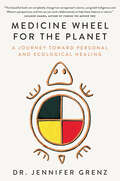
By Dr Jennifer Grenz. 2024
"This beautiful book can completely change how we approach science, using both Indigenous and Western perspectives, and how we can…
work collaboratively to help foster balance in nature." —Suzanne Simard, bestselling author of Finding the Mother TreeA farm kid at heart, and a Nlaka'pamux woman of mixed ancestry, Dr. Jennifer Grenz always felt a deep connection to the land. However, after nearly two decades of working as a restoration ecologist in the Pacific Northwest, she became frustrated that despite the best efforts of her colleagues and numerous volunteers, they weren't making the meaningful change needed for plant, animal and human communities to adapt to a warming climate. Restoration ecology is grounded in an idea that we must return the natural world to an untouched, pristine state, placing humans in a godlike role—a notion at odds with Indigenous histories of purposeful, reciprocal interaction with the environment. This disconnect sent Dr. Grenz on a personal journey of joining her head (Western science) and her heart (Indigenous worldview) to find a truer path toward ecological healing.In Medicine Wheel for the Planet, building on sacred stories, field observations and her own journey, Dr. Grenz invites readers to share in the teachings of the four directions of the medicine wheel: the North, which draws upon the knowledge and wisdom of elders; the East, where we let go of colonial narratives and see with fresh eyes; the South, where we apply new-old worldviews to envision a way forward; and the West, where a relational approach to land reconciliation is realized. Eloquent, inspiring and disruptive, Medicine Wheel for the Planet circles toward an argument that we need more than a singular worldview to protect the planet and make the significant changes we are running out of time for.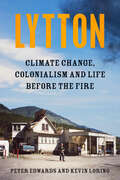
By Peter Edwards, Kevin Loring. 2024
From bestselling true-crime author Peter Edwards and Governor General's Award-winning playwright Kevin Loring, two sons of Lytton, BC, the town…
that burned to the ground in 2021, comes a meditation on hometown―when hometown is gone.&“It&’s dire,&” Greta Thunberg retweeted Mayor JanPolderman. &“The whole town is on fire. It took a whole 15 minutes from the first sign of smoke to, all of a sudden, there being fire everywhere.&”Before it made global headlines as the small town that burned down during a record-breaking heatwave in June 2021, while briefly the hottest placeon Earth, Lytton, British Columbia, had a curious past. Named for the author of the infamous line, &“It was a dark and stormy night,&” Lytton was also where Peter Edwards, organized-crime journalist and author of seventeen non-fiction books, spent his childhood. Although only about 500 people lived in Lytton, Peter liked to joke that he was only the second-best writer to come from his tiny hometown. His grade-school classmate&’s nephew Kevin Loring, Nlaka&’pamux from Lytton First Nation, had grown up to be a Governor General&’s Award–winning playwright. The Nlaka&’pamux called Lytton &“The Centre of the World,&” a view Buddhists would share in the late twentieth century, as they set up a temple just outside town. A gold rush in 1858 saw conflict with a wave of Californians come to a head with the Canyon War at the junction of the mighty Fraser and Thompson rivers. The Nlaka&’pamux lost over thirty lives in that conflict, as did the American gold seekers. In modern times, many outsiders would seek shelter there, often people who just didn&’t fit anywhere else and were hoping for a little anonymity in the mountains. Told from the shared perspective of an Indigenous playwright and the journalist son of a settler doctor who pushed back against the divisions that existed between populations, Lytton portrays all the warmth, humour and sincerity of small-town life. A colourful little town that burned to the ground could be every town&’s warning if we don&’t take seriously what this unique place has to teach us.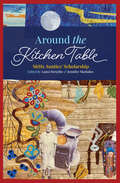
By Jennifer Markides, Laura Forsythe. 2024
Honouring the scholarship of Métis matriarchs While surveying the field of Indigenous studies, Laura Forsythe and Jennifer Markides recognized a…
critical need for not only a Métis-focused volume, but one dedicated to the contributions of Métis women. To address this need, they brought together work by new and established scholars, artists, storytellers, and community leaders that reflects the diversity of research created by Métis women as it is lived, considered, conceptualized, and re-imagined. With writing by Emma LaRocque and other forerunners of Métis studies, Around the Kitchen Table looks beyond the patriarchy to document and celebrate the scholarship of Métis women. Focusing on experiences in post-secondary environments, this collection necessarily traverses a range of methodologies. Spanning disciplines of social work, education, history, health care, urban studies, sociology, archaeology, and governance, contributors bring their own stories to explorations of spirituality, material culture, colonialism, land-based education, sexuality, language, and representation. The result is an expansive, heartfelt, and accessible community of Métis thought. Reverent and revelatory, this collection centres the strong aunties and grandmothers who have shaped Métis communities, culture, and identities with teachings shared in classrooms, auditoriums, and around the kitchen table.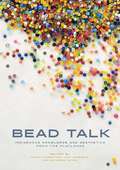
By Carmen Robertson, Judy Anderson, Katherine Boyer. 2024
Sewing new understandings Indigenous beadwork has taken the art world by storm, but it is still sometimes misunderstood as static,…
anthropological artifact. Today’s prairie artists defy this categorization, demonstrating how beads tell stories and reclaim cultural identity. Whether artists seek out and share techniques through YouTube videos or in-person gatherings, beading fosters traditional methods of teaching and learning and enables intergenerational transmissions of pattern and skill. In Bead Talk, editors Carmen Robertson, Judy Anderson, and Katherine Boyer gather conversations, interviews, essays, and full-colour reproductions of beadwork from expert and emerging artists, academics, and curators to illustrate the importance of beading in contemporary Indigenous arts. Taken together, the book poses and responds to philosophical questions about beading on the prairies: How do the practices and processes of beading embody reciprocity, respect, and storytelling? How is beading related to Indigenous ways of knowing? How does beading help individuals reconnect with the land? Why do we bead? Showcasing beaded tumplines, text, masks, regalia, and more, Bead Talk emphasizes that there is no one way to engage with this art. The contributors to this collection invite us all into the beading circle as they reshape how beads are understood and stitch together generations of artists.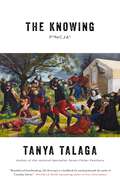
By Tanya Talaga. 2025
From Tanya Talaga, the critically acclaimed and award-winning author of Seven Fallen Feathers, comes a riveting exploration of her family’s…
story and a retelling of the history of the country we now call Canada For generations, Indigenous People have known that their family members disappeared, many of them after being sent to residential schools, “Indian hospitals” and asylums through a coordinated system designed to destroy who the First Nations, Métis and Inuit people are. This is one of Canada’s greatest open secrets, an unhealed wound that until recently lay hidden by shame and abandonment. The Knowing is the unfolding of Canadian history unlike anything we have ever read before. Award-winning and bestselling Anishinaabe author Tanya Talaga retells the history of this country as only she can—through an Indigenous lens, beginning with the life of her great-great grandmother Annie Carpenter and her family as they experienced decades of government- and Church-sanctioned enfranchisement and genocide. Deeply personal and meticulously researched, The Knowing is a seminal unravelling of the centuries-long oppression of Indigenous People that continues to reverberate in these communities today.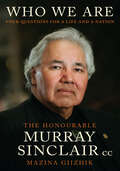
By Murray Sinclair. 2024
Named a Book to Read This Fall by CBC Books and the Toronto Star • One of Indigo&’s Most Anticipated…
BooksJudge, senator, and activist. Father, grandfather, and friend. This is Murray Sinclair&’s story—and the story of a nation—in his own words, an oral history that forgoes the trappings of the traditionally written memoir to center Indigenous ways of knowledge and storytelling. As Canada moves forward into the future of Reconciliation, one of its greatest leaders guides us to ask the most important and difficult question we can ask of ourselves: Who are we?For decades, Senator Sinclair has fearlessly educated Canadians about the painful truths of our history. He was the first Indigenous judge in Manitoba, and only the second Indigenous judge in Canadian history. He was the Chair of the Truth and Reconciliation Commission, and remains one of the foremost voices on Reconciliation. And now, for the first time, he shares his full story—and his full vision for our nation—with readers across Canada and beyond.Drawing on Senator Sinclair&’s perspectives regarding Indigenous identity, human rights, and justice, Who We Are examines the roles of history, resistance, and resilience in the pursuit of finding a path forward, one that heals the damaged relationship between Indigenous and non-Indigenous peoples in Canada. In doing so, it reveals Senator Sinclair&’s life in a new and direct way, exploring how all of these unique experiences have shaped him as an Anishinaabe man, father, and grandfather.Structured around the four questions that have long shaped Senator Sinclair&’s thinking and worldview—Where do I come from? Where am I going? Why am I here? Who am I?—Who We Are takes readers into the story of his remarkable life as never before, while challenging them to embrace an inclusive vision for our shared future.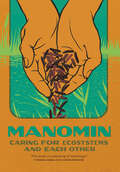
By Brittany Luby, Jane Mariotti, Samantha Mehltretter, Andrea Bradford, Niisaachewan Anishinaabe Nation, Dani Kastelein. 2024
Reclaiming crops and culture on Turtle Island Manomin, more commonly known by its English misnomer “wild rice,” is the only…
cereal grain native to Turtle Island (North America). Long central to Indigenous societies and diets, this complex carbohydrate is seen by the Anishinaabeg as a gift from Creator, a “spirit berry” that has allowed the Nation to flourish for generations. Manomin: Caring for Ecosystems and Each Other offers a community-engaged analysis of the under-studied grain, weaving together the voices of scholars, chefs, harvesters, engineers, poets, and artists to share the plant’s many lessons about the living relationships between all forms of creation. Grounded in Indigenous methodologies and rendered in full colour, Manomin reveals and examines our interconnectedness through a variety of disciplines—history, food studies, ethnobotany, ecology—and forms of expression, including recipes, stories, and photos. A powerful contribution to conversations on Indigenous food security and food sovereignty, the collection explores historic uses of Manomin, contemporary challenges to Indigenous aquaculture, and future possibilities for restoring the sacred crop as a staple. In our time of ecological crisis, Manomin teaches us how to live well in the world, sustaining our relations with each other, our food, and our waterways.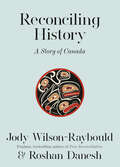
By Jody Wilson-Raybould, Roshan Danesh. 2024
One of Indigo's Top 10 History Books of 2024 and Top 100 Books of 2024 • One of the Toronto Star&’s…
25 books to read this seasonFrom the #1 national bestselling author of 'Indian' in the Cabinet and True Reconciliation, a truly unique history of our land—powerful, devastating, remarkable—as told through the voices of both Indigenous and non-Indigenous peoples.The totem pole forms the foundation for this unique and important oral history of Canada. Its goal is both toweringly ambitious and beautifully direct: To tell the story of this country in a way that prompts readers to look from different angles, to see its dimensions, its curves, and its cuts. To see that history has an arc, just as the totem pole rises, but to realize that it is also in the details along the way that important meanings are to be found. To recognize that the story of the past is always there to be retold and recast, and must be conveyed to generations to come. That in the act of re-telling, meaning is found, and strength is built.When it comes to telling the history of Canada, and in particular the history of the relationship between Indigenous and non-Indigenous peoples, we need to accept that the way in which our history has traditionally been told has not been a common or shared enterprise. In many ways, it has been an exclusive and siloed one. Among the countless peoples and groups that make up this vast country, the voices and experiences of a few have too often dominated those of many others.Reconciling History shares voices that have seldom been heard, and in this ground-breaking book they are telling and re-telling history from their perspectives. Born out of the oral history in True Reconciliation, and complemented throughout with stunning photography and art, Reconciling History takes this approach to telling our collective story to an entirely different level.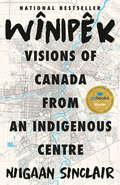
By Niigaan Sinclair. 2024
NATIONAL BESTSELLERFrom ground zero of this country's most important project: reconciliationNiigaan Sinclair has been called provocative, revolutionary, and one of…
this country's most influential thinkers on the issues impacting Indigenous cultures, communities, and reconciliation in Canada. In his debut collection of stories, observations, and thoughts about Winnipeg, the place he calls "ground zero" of Canada's future, read about the complex history and contributions of this place alongside the radical solutions to injustice and violence found here, presenting solutions for a country that has forgotten principles of treaty and inclusivity. It is here, in the place where Canada began—where the land, water, people, and animals meet— that a path "from the centre" is happening for all to see.At a crucial and fragile moment in Canada's long history with Indigenous peoples, one of our most essential writers begins at the centre, capturing a web spanning centuries of community, art, and resistance. Based on years' worth of columns, Niigaan Sinclair delivers a defining essay collection on the resilience of Indigenous peoples. Here, we meet the creators, leaders, and everyday people preserving the beauty of their heritage one day at a time. But we also meet the ugliest side of colonialism, the Indian Act, and the communities who suffer most from its atrocities. Sinclair uses the story of Winnipeg to illuminate the reality of Indigenous life all over what is called Canada. This is a book that demands change and celebrates those fighting for it, that reminds us of what must be reconciled and holds accountable those who must do the work. It's a book that reminds us of the power that comes from loving a place, even as that place is violently taken away from you, and the magic of fighting your way back to it.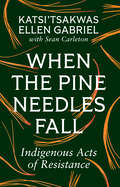
By Katsi’tsakwas Ellen Gabriel. 2024
There have been many things written about Canada’s violent siege of Kanehsatà:ke and Kahnawà:ke in the summer of 1990, but…
When the Pine Needles Fall: Indigenous Acts of Resistance is the first book from the perspective of Katsi’tsakwas Ellen Gabriel, who was the Kanien’kehá:ka (Mohawk) spokesperson during the siege. When the Pine Needles Fall, written in a conversational style by Gabriel with historian Sean Carleton, offers an intimate look at Gabriel’s life leading up to the 1990 siege, her experiences as spokesperson for her community, and her work since then as an Indigenous land defender, human rights activist, and feminist leader. More than just the memoir of an extraordinary individual, When the Pine Needles Fall offers insight into Indigenous language, history, and philosophy, reflections on our relationship with the land, and calls to action against both colonialism and capitalism as we face the climate crisis. Gabriel’s hopes for a decolonial future make clear why protecting Indigenous homelands is vital not only for the survival of Indigenous peoples, but for all who live on this planet.